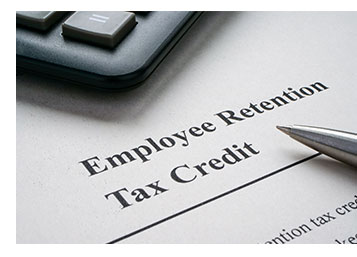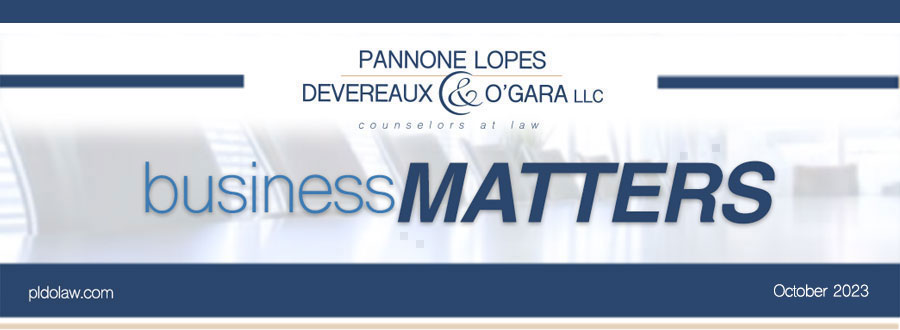| |
THIS ISSUE'S HEADLINES
IRS Announces Moratorium on Processing New Employee Retention Credit Claims
Who’s Ready to Save? Commercial Electric Customers in Rhode Island Now Eligible for Specialized Net Metering Savings
Doing Business with a Company or Its Officers? Be Aware of the Honest Services Fraud Statute

IRS ANNOUNCES MORATORIUM ON PROCESSING NEW EMPLOYEE RETENTION CREDIT CLAIMS
 The Employee Retention Credit (“ERC”) was adopted during the pandemic to mitigate some of the economic burdens felt by businesses. Unfortunately, the program's good intentions have been plagued with abuse and schemes. Amid rising concerns about a flood of claims filed by ineligible businesses that were misled by fraudulent promoters, on September 14, 2023, the IRS announced an immediate moratorium through at least the end of the year on processing new ERC claims. In a separate announcement, also issued on September 14, 2023, the IRS listed several “red flags” that may be indicative of an ERC scam. The Employee Retention Credit (“ERC”) was adopted during the pandemic to mitigate some of the economic burdens felt by businesses. Unfortunately, the program's good intentions have been plagued with abuse and schemes. Amid rising concerns about a flood of claims filed by ineligible businesses that were misled by fraudulent promoters, on September 14, 2023, the IRS announced an immediate moratorium through at least the end of the year on processing new ERC claims. In a separate announcement, also issued on September 14, 2023, the IRS listed several “red flags” that may be indicative of an ERC scam.
To help educate and protect businesses from fraudulent claims, which can result in penalties, high interest payments, and, in some cases, a criminal investigation, PLDO Partner William F. Miller issued a Client Advisory that can be accessed by clicking here.
If you have questions about the ERC or the IRS’s moratorium, please contact Attorney Miller at 508-420-7159 or email wmiller@pldolaw.com.
[back to top]

WHO’S READY TO SAVE? COMMERCIAL ELECTRIC CUSTOMERS IN RHODE ISLAND NOW ELIGIBLE FOR SPECIALIZED NET METERING SAVINGS
 For the first time ever, Rhode Island’s commercial electricity customers can participate in net metering credit finance arrangements under Rhode Island law. Available only to nonprofit corporations and educational institutions in past years, Rhode Island’s general assembly recently expanded access a few months ago. This broader access will allow commercial customers to materially reduce their electricity bills while not incurring any upfront costs. For the first time ever, Rhode Island’s commercial electricity customers can participate in net metering credit finance arrangements under Rhode Island law. Available only to nonprofit corporations and educational institutions in past years, Rhode Island’s general assembly recently expanded access a few months ago. This broader access will allow commercial customers to materially reduce their electricity bills while not incurring any upfront costs.
Here’s how it works. Commercial customers contract with a renewable energy developer who, at its own expense, owns, develops, maintains, and operates a renewable energy facility (solar, wind or hydroelectric) within the State of Rhode Island. Typically 15-20 years in duration, the contractual arrangement provides that the developer will attribute to the customer’s utility account a percentage of the electrical generation from the facility directed into the utility grid. In turn, the utility calculates and provides a monetary credit to the commercial customer’s utility account, offsetting or reducing the overall cost of the customers utility bill. The customer then compensates the developer by paying a percentage of the overall net metering credit savings realized on the customer’s utility bill.
In sum, net metering credit finance arrangements can be advantageous to commercial customers. From a financial standpoint, the customer is only obligated to pay when it receives a savings. The developer shoulders all of the risk of project development maintenance and operation. Further, unlike traditional net metering projects, the commercial customer is not obligated to “host” the renewable energy facility on its property. Rather, the customer can benefit from a project located anywhere within Rhode Island. By not having to have a facility on its property, the commercial customer does not have to worry about securing the facility or decommissioning it during and following the projects useful life.
If you are interested in learning more, please contact PLDO partner Benjamin L. Rackliffe at brackliffe@pldolaw.com. Attorney Rackliffe has advised a number of institutional clients and educational institutions through net metering credit finance arrangements.
[back to top]

DOING BUSINESS WITH A COMPANY OR ITS OFFICERS? BE AWARE OF THE HONEST SERVICES FRAUD STATUTE
 Many people are unaware that there is a federal statute, the so-called “honest services fraud” statute (18 U.S.C. § 1346), that actually criminalizes the payment of kickbacks or bribes to corporate officers. Earlier this year, the United States Court of Appeals for the First Circuit had occasion to clarify aspects of “honest services fraud[,]” in a decision (United States v. Abdelaziz, 68 F. 4th 1 (1st Cir. 2023)) which threw-out the convictions of two wealthy fathers charged in connection with a wide-spread college admissions conspiracy (“operation varsity blues”). Many people are unaware that there is a federal statute, the so-called “honest services fraud” statute (18 U.S.C. § 1346), that actually criminalizes the payment of kickbacks or bribes to corporate officers. Earlier this year, the United States Court of Appeals for the First Circuit had occasion to clarify aspects of “honest services fraud[,]” in a decision (United States v. Abdelaziz, 68 F. 4th 1 (1st Cir. 2023)) which threw-out the convictions of two wealthy fathers charged in connection with a wide-spread college admissions conspiracy (“operation varsity blues”).
“Honest services fraud” is said to have occurred when (1) a person, with intent to defraud and using means of interstate commerce (mail or interstate carrier or wire facility), voluntarily and intentionally devised a scheme to defraud an employer of its right to the honest services of an employee through bribery or kickbacks; and (2) when the scheme to defraud involved a fraudulent or a false material promise or concealment of fact. That is, a scheme to defraud another of the intangible right to honest services consists of a scheme to violate a fiduciary duty by bribery or kickback, where a fiduciary duty is defined as a duty, by an employee, to act only for the benefit of the employer. Moreover, a defendant need not owe the fiduciary duty personally, so long as he or she devises or participates in a bribery or kickback scheme intended to deprive the employer of its right to a fiduciary’s honest services. Importantly, then, in the corporate world, a person could face an honest services fraud charge if there is evidence of a “scheme or artifice” designed to defraud others (that is, a scheme to give someone an unfair advantage over others), if the person willfully participated in such scheme by offering or accepting a bribe/kickback, if the scheme had the potential to cause harm by depriving others of “honest services”, and if the scheme made use of the mail or wire services (including the internet).
Individuals in the corporate world, then, should be aware that paying a bribe or a kickback to a company officer, in cahoots with that company officer, for some consideration favorable to the company officer but not to the company itself (the officer’s employer), may qualify as “honest services fraud”. In United States v. Abdelaziz, the First Circuit clarified that where the employer (here, the University) was actually aware of the kickbacks or bribes (the money given by the wealthy parents to the University to ease their Childrens’ admission to the University), the payments could not properly qualify as a kickback or bribe, within the meaning of the “honest services fraud” statute. (That is, there can be no “kickback or bribe” if the employer itself - here, the University - knowingly accepted it.) Importantly though, it is clear from the Abdelaziz decision that kickback/bribery payments made to a company officer, but unbeknownst to the officer’s employer, may be prosecutable as “honest services fraud”. Individuals, then, doing business with or through officers of other companies must, to protect themselves, be vigilant about such company officers soliciting bribes or kickbacks.
If you have questions about this federal statute or other litigation matters, please contact PLDO Partner Aaron L. Weisman at 401-824-5100 or email aweisman@pldolaw.com.
[back to top]
|
 |





